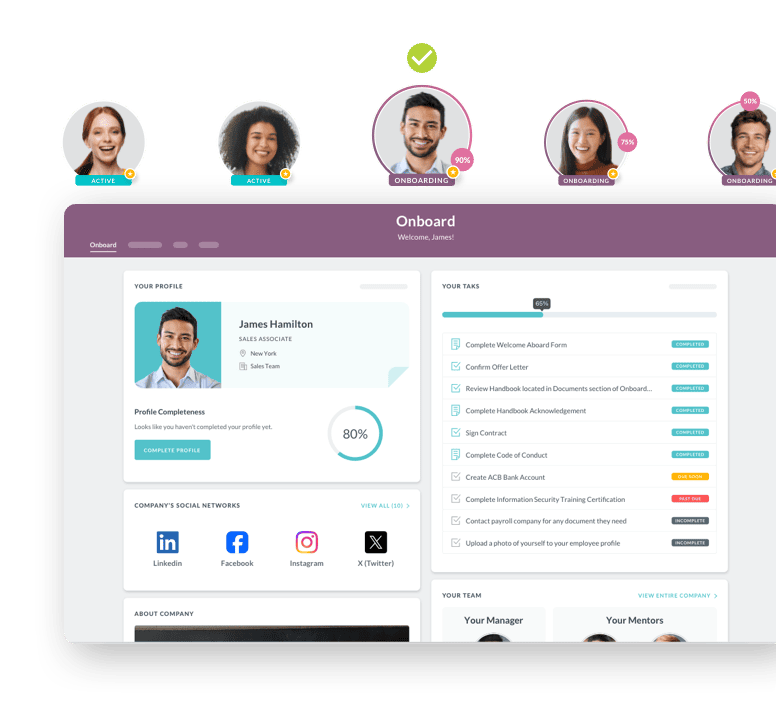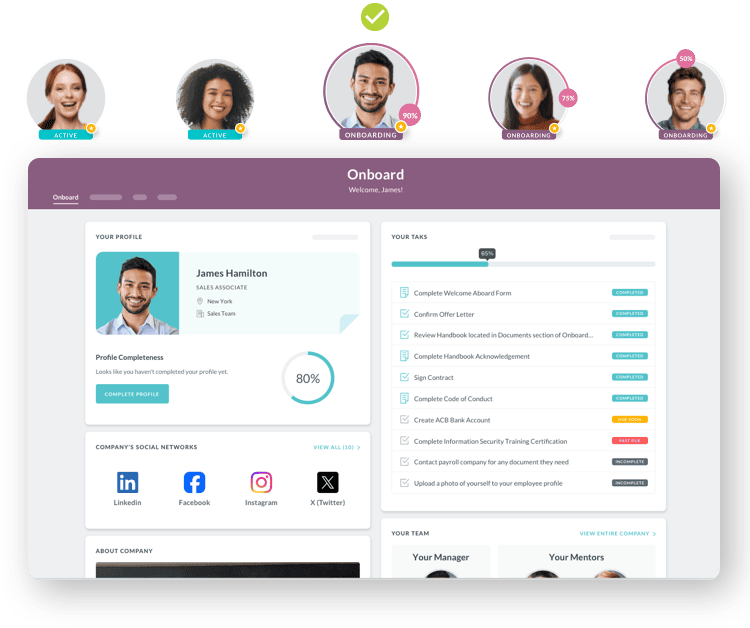Importance of Effective Onboarding and Background Checks for New Employees
-1.jpg)
- What is Employee Onboarding?
- Why is Effective Onboarding Critical for Business Success?
- Who is Responsible for Effective Onboarding?
- Understanding Pre-Employment Background Checks
- Legal Compliance: FCRA and State Requirements
- How to Integrate Background Checks into Your Onboarding Process
- Common Onboarding Mistakes That Undermine Background Check Efforts
- Technology Solutions: Automating Onboarding and Background Checks
- Measuring Success: Key Performance Indicators
- Future Trends: AI and Predictive Analytics in Onboarding
- Conclusion: Building a Foundation for Long-Term Success


 Cut onboarding time
by 60%—here's the
Ultimate Checklist
that helped do it.
Cut onboarding time
by 60%—here's the
Ultimate Checklist
that helped do it.

Effective onboarding combined with comprehensive background checks can improve new hire retention by 82% and boost productivity by over 70%, according to Brandon Hall Group's 2025 research. Yet many organizations struggle to integrate these two critical processes seamlessly.
When you pair a structured employee onboarding process with thorough pre-employment screening, you create a foundation for long-term success. The right approach protects your organization while helping new team members feel welcomed, prepared, and confident from day one.
This guide explores why the integration of onboarding and background checks matters, how to implement both effectively, and which technologies can automate the entire workflow—from offer acceptance to productive team member.
What is Employee Onboarding?
Employee onboarding is the structured process of integrating new hires into an organization through orientation, training, cultural assimilation, and performance expectation setting. Effective onboarding typically spans the first 90 days but can extend up to 12 months for complex roles.
Unlike orientation (which covers basic company information in the first week), comprehensive onboarding encompasses:
-
Pre-boarding activities before the official start date
-
Administrative paperwork and compliance documentation
-
Role-specific training and skill development
-
Cultural integration and team relationship building
-
Performance goal setting and progress tracking
Organizations with structured onboarding programs see 50% higher employee retention and 62% of new hires meeting their first performance milestone, according to SHRM's workplace research.
HR Cloud's Onboard automates every phase of the employee journey, from pre-boarding checklists to 90-day performance check-ins—helping you onboard new hires 3x faster with zero manual follow-ups.
Why is Effective Onboarding Critical for Business Success?
The impact of strong onboarding extends far beyond the first week. Research consistently shows that how you welcome and integrate new employees directly influences their long-term success and decision to stay with your company.
1. Dramatically Improves Employee Retention
Organizations that implement effective onboarding programs see an 82% improvement in new hire retention (Brandon Hall Group, 2025). When companies provide excellent onboarding, 69% of employees are more likely to stay for at least three years (SHRM, 2025).
The numbers tell a compelling story:
-
20% of employee turnover happens within the first 45 days (Glassdoor, 2025)
-
Employees who experience strong onboarding are 58% more likely to remain with the company after three years (LinkedIn Talent Solutions, 2025)
-
Poor onboarding leads to early departures, with 29% of HR leaders reporting that attrition during onboarding is their top challenge (Enboarder, 2025)
Why retention matters financially: Replacing an employee costs approximately 21% of their annual salary, and the average cost to hire a new employee has risen to $4,425 (SHRM, 2024). For a $60,000 position, you're looking at $12,600 in replacement costs plus the productivity loss during the vacancy period.
With HR Cloud's People HRIS integrated with Onboard, you can track retention metrics in real-time, identify at-risk new hires through engagement analytics, and intervene before they consider leaving.
2. Accelerates Time-to-Productivity
Structured onboarding doesn't just keep employees longer—it gets them contributing faster. Companies with effective onboarding report 70% higher productivity among new hires (Gallup, 2025).
Key productivity findings:
-
Employees who went through formal onboarding achieved full productivity 34% faster (SHRM, 2025)
-
77% of employees who went through a formal onboarding process met their first performance goals (eLearning Industry, 2025)
-
Organizations with structured onboarding see 62% of new hires meeting their first performance milestone (Work Institute, 2025)
-
Companies using AI-powered onboarding saw a 50% improvement in new hire time-to-productivity (Gartner, 2025)
Time-to-productivity varies by role complexity, but the pattern is clear: structured support helps employees ramp faster. A sales representative might take 6 months to reach full quota attainment without proper onboarding, but only 4 months with comprehensive training and mentorship.
3. Drives Higher Employee Engagement
First impressions shape the entire employment relationship. When executed well, onboarding creates engaged team members who feel connected to their work and your organization from day one.
Engagement statistics:
-
89% of employees who had a good onboarding experience are engaged at work (BambooHR, 2025)
-
91% of new hires who received effective introduction to company culture say they feel connected to their workplace (BambooHR, 2025)
-
Onboarding satisfaction leads to a 33% improvement in employee engagement (Work Institute, 2025)
-
Organizations with structured onboarding see 60% higher year-one employee engagement compared to those with no formal process
Employees who feel engaged during their first few months demonstrate 18x more commitment to their employer compared to those who experienced ineffective onboarding. This translates to discretionary effort, innovation, and advocacy for your company.
HR Cloud's Workmates extends onboarding beyond paperwork with automated welcome posts, pulse surveys at day 7 and day 30, and peer recognition to celebrate early wins—creating engagement that lasts.


4. Reduces Compliance Risk
Onboarding serves as your primary defense against compliance failures. When documentation gaps exist or deadlines are missed, your organization faces legal and financial exposure.
Compliance challenges solved by structured onboarding:
-
I-9 verification: Must be completed within 3 business days of the start date. Manual processes lead to 52% error rates, while automated systems reduce errors by 73% (Forbes, 2025)
-
Tax form accuracy: Errors in W-4 processing delay payroll and create IRS penalties
-
Policy acknowledgment: Employees must acknowledge handbook policies, anti-discrimination training, and industry-specific regulations
-
Background check timing: FCRA requires specific disclosure and consent procedures
Organizations with automated onboarding maintain consistent compliance across all locations and roles, reducing audit risk significantly.
HR Cloud's I-9 and E-Verify integration automatically tracks compliance deadlines, validates form completion, and submits E-Verify cases—all within your existing onboarding workflow. No manual calendaring required.
Who is Responsible for Effective Onboarding?
Successful onboarding requires coordination across multiple stakeholders, each playing a distinct role in welcoming and integrating new team members.
HR Department / People Operations:
-
Leads overall onboarding strategy and design
-
Manages compliance documentation and background checks
-
Coordinates with IT, payroll, and department managers
-
Tracks completion rates and identifies bottlenecks
-
Conducts new hire surveys and gathers feedback
Hiring Managers:
-
Delivers role-specific training and expectations
-
Introduces new hire to the team and key stakeholders
-
Sets performance goals and provides early feedback
-
Serves as primary point of contact for questions
-
Monitors integration and addresses concerns
IT Department:
-
Provisions equipment, accounts, and system access
-
Conducts security training and password setup
-
Ensures new hire has required software licenses
-
Provides technical support during first week
Peer Mentors / Onboarding Buddies: According to Sapling HR (2021), 47% of businesses use buddy programs to enhance onboarding. A peer mentor:
-
Answers cultural and procedural questions
-
Provides informal guidance and support
-
Helps new hire build internal network
-
Offers perspective beyond the manager relationship
HR Cloud's workflow automation assigns tasks to the right person automatically based on role, department, and trigger events—so IT gets their checklist, the manager gets theirs, and nothing falls through the cracks.
Understanding Pre-Employment Background Checks
While effective onboarding sets employees up for success, background checks ensure you're bringing the right people onto your team in the first place. These two processes work hand-in-hand to reduce risk and improve long-term outcomes.
What is a Pre-Employment Background Check?
A background check is a third-party review of an applicant's history conducted after extending a conditional job offer. Depending on the role and industry, checks can include:
1. Identity Verification
-
Social Security Number validation
-
Address history confirmation
-
Right-to-work status
2. Criminal Background Check
-
County, state, and federal criminal records
-
Sex offender registry searches
-
Warrants and pending charges
3. Employment Verification
-
Previous employers and job titles
-
Employment dates and reasons for leaving
-
Eligibility for rehire status
4. Education Verification
-
Degree confirmation from educational institutions
-
Certification and license validation
-
Professional credentials
5. Credit History (role-dependent)
-
Financial responsibility indicators
-
Bankruptcy and judgment records
-
Required for positions with financial access
6. Motor Vehicle Records (if applicable)
-
Driving history for roles requiring vehicle operation
-
License status and violations
-
Insurance risk assessment
 — Kaylee Collins, HR Analyst
— Kaylee Collins, HR Analyst

Why Conduct Background Checks?
The case for comprehensive screening is straightforward: verification protects your organization, your employees, and your customers.
Key reasons to implement background checks:
1. Verify Candidate Claims. Studies suggest that a significant percentage of job applications contain inaccurate information. Background checks help you separate truth from embellishment, ensuring candidates possess the qualifications they claim.
2. Protect Workplace Safety. For roles with access to vulnerable populations, controlled substances, or sensitive data, criminal background checks identify candidates who may pose risks. A healthcare facility screening for recent drug-related offenses protects both patients and staff.
3. Ensure Industry Compliance. Background checks are legally mandated for certain sectors:
-
Healthcare: Criminal checks and license verification
-
Education: Fingerprinting and child abuse clearances
-
Transportation: DOT drug testing and driving record checks
-
Financial Services: Credit checks and FINRA registration verification
4. Reduce Negligent Hiring Liability. Employers can be held liable if an employee harms someone and the employer failed to exercise reasonable care in hiring. Background checks demonstrate due diligence and can be critical in defending against negligent hiring claims.
5. Improve Quality of Hire. Employment and education verification ensures candidates have the experience and credentials necessary for success. This reduces early terminations due to skill mismatches.
HR Cloud's Checkr integration embeds background checks directly into your onboarding workflow. New hires complete consent forms through their onboarding portal, results populate automatically in their employee record, and you stay compliant with FCRA requirements—no context switching required.
Legal Compliance: FCRA and State Requirements
The Fair Credit Reporting Act (FCRA) regulates how employers can use consumer reports (including background checks) in hiring decisions. Non-compliance can result in lawsuits, fines, and reputational damage.
FCRA Requirements for Employers:
1. Disclosure: Provide written notice that a background check will be conducted
2. Authorization: Obtain written consent from the candidate
3. Pre-Adverse Action: If planning to deny employment based on findings, provide:
-
A copy of the background check report
-
Notice of FCRA rights
-
Opportunity to dispute inaccuracies
4. Adverse Action Notice: If employment is denied, send formal notification including:
-
Name of the screening company
-
Statement that the screening company did not make the hiring decision
-
Notice of right to dispute findings
State-Specific Considerations:
Many states impose additional restrictions beyond federal FCRA requirements:
-
Ban the Box Laws: 37 states restrict when employers can ask about criminal history
-
Salary History Bans: Multiple states prohibit asking about previous compensation
-
Credit Check Limitations: California, Illinois, and others restrict credit report usage
-
Time Limitations: Some jurisdictions limit how far back criminal history searches can go
HR Cloud's compliance engine tracks state-specific requirements and automatically adjusts disclosure forms, consent language, and timing based on the candidate's location—reducing your legal risk.
How to Integrate Background Checks into Your Onboarding Process
The most effective approach combines background checks seamlessly with your broader onboarding workflow, creating a smooth experience for candidates while maintaining thorough vetting.
Recommended Timeline:
Pre-Offer Stage:
-
Notify candidates that background checks are part of the hiring process
-
Set expectations for timing and what will be checked
-
Answer questions about the screening process
Post-Offer, Pre-Start:
1. Day of Offer: Send conditional offer letter explaining offer is contingent upon successful background check completion
2. Within 24 Hours: Candidate receives background check authorization forms via secure portal
3. Days 1-3: Screening company initiates checks (usually takes 2-5 business days)
4. Day 4-7: Results returned and reviewed by HR
5. Day 7-10: Final offer confirmation or adverse action notice if issues arise
6. Start Date: Background check cleared, begin regular onboarding activities
Integration with Technology Platforms:
Manual background check processes create delays, data entry errors, and compliance gaps. Modern HR onboarding software solves these challenges through direct integration.
Benefits of integrated background checks:
-
Single Workflow: New hire completes one portal for all pre-boarding tasks
-
Automatic Status Updates: Real-time visibility into background check progress
-
Audit Trails: Complete documentation of disclosure, consent, and results
-
Conditional Logic: System automatically holds onboarding tasks until clearance received
-
Data Accuracy: Results flow directly into HRIS without manual entry
When you connect HR Cloud Onboard with Checkr, new hires receive background check consent forms as part of their welcome email. They complete everything in one mobile-friendly portal, results are stored in their employee record, and your team gets automated notifications when clearance is received. No spreadsheets, no phone calls, no friction.
Best Practices for Candidate Experience:
Background checks can create anxiety for candidates. Transparent communication and efficient processes reduce stress and maintain positive relationships.
Communication Guidelines:
1. Be upfront about the process - Explain what will be checked, why, and how long it takes
2. Provide a dedicated contact - Give candidates one person they can reach with questions
3. Send regular updates - Automated status emails keep candidates informed
4. Explain next steps clearly - Tell candidates what happens after results are received
5. Handle discrepancies fairly - If issues arise, discuss with the candidate before making final decisions
Common Candidate Questions:
-
"What exactly are you checking?"
-
"How long will this take?"
-
"Will this affect my current employment?"
-
"What happens if something shows up?"
-
"Can I dispute inaccurate information?"
Prepare your HR team with scripted answers that are honest, reassuring, and compliant.
Common Onboarding Mistakes That Undermine Background Check Efforts
Even organizations that conduct thorough background checks can sabotage their hiring outcomes through poor onboarding execution.
Mistake #1: Disconnected Systems
The Problem: Background checks are managed in one platform, onboarding in another, and HRIS in a third. HR manually transfers information, creating delays and errors.
The Impact:
-
New hires wait for clearance confirmation
-
Compliance documentation lives in silos
-
Audit preparation requires gathering files from multiple sources
The Solution: Use integrated HR platforms where background checks, onboarding workflows, and employee records exist in one system.
Mistake #2: Front-Loading All Activities on Day One
The Problem: Organizations wait until background checks clear, then dump all onboarding tasks into the new hire's first day. The result: overwhelmed employees, uncompleted forms, and a chaotic first impression.
The Impact:
-
81% of employees report feeling overwhelmed during onboarding (Forbes, 2024)
-
Lower retention when first-day experience is negative
-
Incomplete compliance documentation
The Solution: Implement pre-boarding that begins as soon as the background check clears. Send welcome materials, paperwork, and training videos before day one so the first day focuses on connection, not administration.
According to Enboarder (2018), world-class organizations are 53% more likely to offer pre-boarding activities.
Mistake #3: Treating Onboarding as a One-Week Checklist
The Problem: Onboarding is often viewed as the first week's paperwork and orientation, rather than a months-long integration process.
The Impact:
-
Only 37% of businesses ensure their onboarding process lasts longer than a month (Aberdeen, 2018)
-
58% of organizations say their onboarding programs mainly focus on processes and paperwork (Sapling HR, 2021)
-
New hires don't fully integrate into company culture or understand performance expectations
The Solution: Design onboarding programs that span at least 90 days, with structured check-ins at day 7, day 30, day 60, and day 90. Include:
-
Week 1: Administrative setup and team introductions
-
Week 2-4: Role-specific training and initial projects
-
Month 2: Expanding responsibilities and manager feedback
-
Month 3: Performance goal setting and culture integration
Companies with onboarding programs extending to 90 days see 50% higher retention (Harvard Business Review, 2025).
Mistake #4: No Manager Involvement
The Problem: HR owns onboarding entirely, and managers don't engage until the new hire's first day (or later).
The Impact:
-
37% of employees say their manager did not play a vital role in their onboarding experience (BambooHR, 2023)
-
New hires lack role clarity and performance expectations
-
Disconnect between what HR communicates and what the job actually involves
The Solution: Hold managers accountable for onboarding responsibilities:
-
Pre-day-one welcome call from the manager
-
First-week 1-on-1 to set expectations
-
Weekly check-ins during month one
-
30-day performance conversation
HR Cloud's task assignment automatically notifies managers when new hires are cleared and assigns manager-specific tasks like "Schedule welcome call" or "Complete day-30 check-in"—ensuring accountability.
Mistake #5: Forgetting to Measure Effectiveness
The Problem: Organizations implement onboarding programs but never evaluate whether they're working. Without metrics, you can't improve.
The Impact:
-
55% of organizations do not measure the effectiveness of their onboarding programs (Businesswise, 2024)
-
Missed opportunities to identify drop-off points
-
No data to justify onboarding investments
The Solution: Track these key metrics:
-
Time-to-Productivity: How long until new hires reach full performance?
-
90-Day Retention Rate: What percentage of new hires stay past their first 90 days?
-
New Hire Satisfaction: Pulse surveys at day 7, day 30, and day 90
-
Completion Rates: Are onboarding tasks being finished on time?
-
Manager Feedback: Do managers feel new hires are prepared?
HR Cloud's analytics dashboard shows real-time completion rates by location, department, and role—plus new hire satisfaction scores and manager feedback in one view.
Technology Solutions: Automating Onboarding and Background Checks
Manual onboarding processes create delays, compliance gaps, and poor employee experiences. Technology eliminates these challenges while freeing your HR team to focus on high-value work.
The Case for Automation
Current State of Onboarding Technology:
-
76% of companies believe automation would significantly improve the new hire experience (Aptitude Research, 2022)
-
Yet only 20% of companies are automating all aspects of onboarding (Aptitude Research, 2022)
-
26.5% of HR professionals say technology is the missing ingredient from their organization's onboarding program (SHRM, 2024)
What Automation Delivers:
-
60% reduction in onboarding time (HR Cloud customers)
-
73% reduction in data entry errors (Forbes, 2025)
-
65% increase in new hire productivity (Enboarder, 2024)
-
50% increase in eNPS scores (Enboarder, 2024)
-
77% decrease in turnover under 3 months (Enboarder, 2024)
Core Features of Modern Onboarding Software
1. Workflow Automation: Automatically trigger tasks based on events:
-
Offer accepted → Send pre-boarding welcome email
-
Background check cleared → Unlock onboarding portal
-
Day 7 → Send pulse survey to new hire
-
Day 30 → Notify manager to complete check-in
2 . Electronic Forms and Signatures: Digitize all paperwork:
-
I-9 with Section 2 remote completion
-
W-4 with IRS validation
-
Direct deposit authorization
-
Benefit elections
-
Policy acknowledgments
-
Custom company forms
3. Background Check Integration: Embed screening directly into your workflow:
-
Candidates complete consent forms in portal
-
Automated case initiation with screening provider
-
Real-time status updates
-
Results automatically stored in employee record
4. Mobile-First Experience: 43% of employees prefer digital onboarding processes (PwC, 2025). Your solution must work flawlessly on mobile:
-
Responsive design for phones and tablets
-
Document capture via camera
-
Push notifications for task reminders
-
SMS delivery options
5. Compliance Management: Reduce audit risk with built-in compliance:
-
State-specific form variations
-
Deadline tracking and reminders
-
Complete audit trails with timestamps
-
Secure document storage
6. Reporting and Analytics: Get visibility into onboarding effectiveness:
-
Completion rates by department
-
Bottlenecks and overdue tasks
-
New hire satisfaction trends
-
Time-to-productivity metrics
HR Cloud brings all of these capabilities together in one platform—from Checkr background checks to I-9 verification to new hire surveys—with ADP, UKG, and Workday integration so employee data flows seamlessly to payroll.
Measuring Success: Key Performance Indicators
Effective onboarding and background screening programs generate measurable business outcomes. Track these KPIs to prove ROI and identify improvement opportunities.
Onboarding Metrics:
1. New Hire Retention Rate
-
Calculation: (# of new hires remaining after 90 days) / (# of new hires at start of period) x 100
-
Benchmark: Organizations with structured onboarding see 50% higher retention (HBR, 2025)
-
Action: If retention is below 85% at 90 days, investigate onboarding quality
2. Time-to-Productivity
-
Calculation: Days from start date until new hire reaches target performance level
-
Benchmark: Formal onboarding achieves full productivity 34% faster (SHRM, 2025)
-
Action: Survey managers to define "full productivity" by role, then measure actual time
3. Onboarding Completion Rate
-
Calculation: (# of tasks completed by deadline) / (# of tasks assigned) x 100
-
Benchmark: Top-performing organizations maintain >95% on-time completion
-
Action: Identify which tasks are frequently incomplete—is it unclear ownership or unrealistic timing?
4. New Hire Satisfaction Score
-
Calculation: Average rating on pulse surveys at day 7, day 30, day 90
-
Benchmark: 89% of employees with good onboarding are satisfied at work (BambooHR, 2025)
-
Action: Scores below 7/10 indicate experience gaps requiring immediate attention
5. Manager Satisfaction with New Hire Readiness
-
Calculation: Manager survey ratings on new hire preparedness
-
Benchmark: 77% of employees meeting first performance goals indicates effective onboarding (eLearning Industry, 2025)
-
Action: Low manager satisfaction suggests training or job preview gaps
Background Check Metrics:
1. Time-to-Clear
-
Calculation: Days from authorization to results received
-
Benchmark: 2-5 business days for standard checks
-
Action: Long delays may indicate incomplete candidate information or screening partner issues
2. Adverse Findings Rate
-
Calculation: (# of checks with disqualifying findings) / (# of total checks run) x 100
-
Action: High rates may indicate sourcing quality issues; low rates confirm effective screening
3. Dispute Rate
-
Calculation: (# of candidates disputing findings) / (# of adverse findings) x 100
-
Benchmark: <5% dispute rate typical
-
Action: High disputes suggest inaccurate data or poor candidate communication
Future Trends: AI and Predictive Analytics in Onboarding
The onboarding landscape is evolving rapidly as AI and machine learning create new possibilities for personalization and efficiency.
Emerging Capabilities:
1. Personalized Onboarding Paths: AI analyzes role, department, location, and experience level to auto-generate customized task lists. A remote engineer gets different training than an in-office sales rep, automatically.
2. Predictive Retention Modeling: Machine learning identifies new hires at risk of early departure based on engagement signals, task completion patterns, and survey responses—allowing HR to intervene proactively.
3. Intelligent Task Sequencing: AI optimizes task order based on dependency relationships and new hire progress, eliminating bottlenecks.
4. Automated Background Check Adjudication: AI pre-screens background check results against company policies, flagging only true disqualifying factors for human review—reducing time-to-decision.
According to Gartner (2025), companies using AI for onboarding saw a 50% improvement in new hire time-to-productivity. This technology is moving from experimental to essential.
Conclusion: Building a Foundation for Long-Term Success
Effective onboarding and thorough background checks aren't separate initiatives—they're two sides of the same strategic effort to build a strong, safe, engaged workforce.
The research is clear:
-
82% improvement in retention with structured onboarding (Brandon Hall Group, 2025)
-
70% productivity boost for new hires who receive strong onboarding (Gallup, 2025)
-
Significant risk reduction through comprehensive background screening
-
60% time savings through workflow automation (HR Cloud customers)
The challenge is execution. Most organizations know onboarding matters, but only 36% have a formalized system in place (CareerBuilder, 2024). The gap between knowing and doing represents your competitive advantage.
Start with these action steps:
1. Audit your current state - Map your existing onboarding and background check processes. Where are the delays? What's manual? What's inconsistent?
2. Define your ideal experience - What should the candidate and new hire experience feel like? What outcomes do you want at day 30, day 60, day 90?
3. Choose technology that integrates - Don't settle for disconnected tools. Select platforms that connect background checks, onboarding workflows, and HRIS in one system.
4. Measure relentlessly - Track retention, time-to-productivity, satisfaction, and completion rates. Use data to continuously improve.
5. Make it a priority - Assign executive ownership to onboarding success. Budget accordingly. Train managers. Celebrate wins.
The employees you hire today will determine your company's trajectory for years to come. Investing in the systems and processes to welcome them properly isn't optional—it's strategic.
Ready to transform your onboarding process? See how HR Cloud automates onboarding and background checks in one unified platform, helping growing teams onboard 3x faster while reducing compliance risk.
 Discover how our HR solutions streamline onboarding, boost employee engagement, and simplify HR management
Discover how our HR solutions streamline onboarding, boost employee engagement, and simplify HR management
Frequently Asked Questions
Q: How long should the onboarding process last?
A: Effective onboarding typically spans 90 days minimum, though some programs extend to 12 months for complex roles. Companies with 90-day programs see 50% higher retention compared to those with one-week onboarding (HBR, 2025).
Q: When should background checks be conducted?
A: Background checks should occur after extending a conditional offer but before the start date. This protects both parties—candidates don't waste time in interviews if they won't pass screening, and employers don't invest in training someone who may not be eligible to work.
Q: What's included in a standard background check?
A: Most checks include identity verification, criminal records search, employment history verification, and education confirmation. Additional checks like credit reports or driving records are added based on role requirements.
Q: Are background checks required by law?
A: Background checks are mandatory in certain industries (healthcare, education, transportation, financial services) but optional in many others. However, even when not legally required, screening protects your organization from negligent hiring liability.
Q: How much does onboarding automation cost?
A: Pricing varies by company size and features, but most platforms charge $3-$8 per employee per month. The ROI is significant: one poorly executed onboarding that leads to turnover costs 21% of the employee's annual salary (SHRM, 2025).
Q: Can remote employees be onboarded effectively?
A: Absolutely. Remote employees with effective virtual onboarding are 54% more productive in their first six months (Gallup, 2025). The key is structured communication, video training, and technology that works on mobile devices.
Q: How do I handle adverse background check findings?
A: Follow FCRA requirements: send pre-adverse action notice with a copy of the report, allow time for dispute, then send final adverse action notice if proceeding with denial. Document everything for legal protection.
Q: What's the most common onboarding mistake?
A: Front-loading all activities on day one. This overwhelms new hires and reduces completion rates. Instead, use pre-boarding to spread tasks across the week before their start date.
Q: Do I need different background checks for different roles?
A: Yes. Tailor your screening based on role requirements. Finance positions need credit checks, driving roles require MVR checks, healthcare requires license verification, and positions with vulnerable populations need thorough criminal screening.
Q: How can I improve my onboarding completion rates?
A: Use automation to send task reminders, make forms mobile-friendly, implement pre-boarding to spread tasks over time, assign clear ownership to each task, and track bottlenecks through analytics.

Keep Reading
A Practical Guide to Standardizing Staff Onboarding Across Multiple University Campuses
The Medical School does it one way. The Engineering Department does it another. And the
Implement Standard Blueprint for Teacher Onboarding: Ensure Equity Across Your District
Picture this: It's the first day of the new session. Two new teachers are starting in
I-9, E-Verify, and State Clearances: Making K-12 Onboarding Audit-Proof
It's 6:30 a.m. on the first day of school. Your new science teacher started yesterday.
Like What You Hear?
We'd love to chat with you more about how HR Cloud® can support your business's HR needs. Book Your Free Demo

Build a Culture of Recognition. Boost Engagement. Guaranteed.
Workmates empowers employees to stay informed, connected, and appreciated—whether they’re on the front line, in the office, or remote. Recognition drives 12x higher engagement.Trusted by industry leaders in every sector




Cut Onboarding Costs by 60%.
Take the confusion and follow-ups out of onboarding with automated workflows, digital forms, and structured portals—so new hires ramp faster 3X quicker.Trusted by industry leaders in every sector




